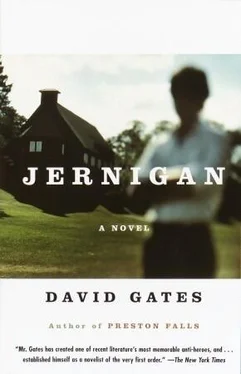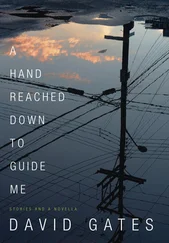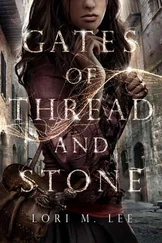Nobody answered the phone, and I hurt like a three-year-old at the thought that she had a life of her own.
Danny wasn’t home when I got back from work. Called over to the Peretskys’, got Clarissa. Yes, Danny was there, but her mother wouldn’t be home until eight. Did I want to talk to Danny? Did I want her mother to call me when she got back? No, no, not important.
I called again at nine-thirty. Not back yet. Tell her … tell her I’ll try to reach her later in the week. Nothing important, tell her. Catch up with her eventually.
Went to work the next day, came home. The phone was ringing as I unlocked the door; son of a bitch stopped just as I got to it. Danny, of course, wasn’t home. Phone rang again ten minutes later. Her. “Clarissa is such a space case,” she said. “She didn’t tell me you’d called until this afternoon . I could’ve killed her. So”—deep sigh—“how are you?”
1
Eight days before my father died, I had driven up to Woodstock to see him. Oh, no premonitions; just the routine visit I’d been making every couple of months. Better quickly say Woodstock, Connecticut. He bought there in 1970, convinced it was going to be discovered, like the Woodstocks of New York and Vermont. Certainly it became unaffordable, like everyplace else, but as far as I could see it hadn’t been discovered in the sense he meant. Just another pretty New England town with no reason for anybody to be there.
“So how do things march down there in America?” he said, pouring a glass of George Dickel for me and a smaller amount for himself. America, in his code, meant New Jersey. The whiskey glugged, as it will out of a new bottle. His face seemed redder than ever, and his belly forced gaps between the pearloid buttons of his denim shirt.
“A lot you care, you old beatnik,” I said. “I bet you don’t even watch Wheel of Fortune up here. What do you do with yourself, anyway? Read Emerson all day?”
“Emerson?” he said. “What do you think, I’m going native? Emerson tv, maybe. Actually, I was thinking about trying to get my Latin working again so I could read the Eclogues . Or maybe it’s the Georgics— what the hell am I trying to think of? There’s one about shepherds and one about farming. One I want is the one about farming.”
“Then you want the Georgics,” I said. “I think.”
“Let me write this down,” he said. “So you still remember all this business.”
“You can take the boy out of the academy …,” I said. “So what have you been up to?”
“Here you see it,” he said, raising his glass, which was almost empty already. “Nah, I do this and that. Work a little bit. You want to see a couple things? Don’t say yes just to humor an old man. On the other hand, don’t say no.”
“What can I say?” I said.
“And mind you praise ’em up,” he said, getting to his feet and setting down his empty glass. “No matter how much they secretly depress you.”
“This must be hot shit,” I said. “Assuming I’m uncrumpling your ironies correctly.”
“Well,” he said, obviously pleased with himself, “you’ll see what you think.”
I got up and followed him. “Leave it,” he said, pointing to my glass. “House rule. No bringing sauce into the workplace. Unless,” he said, patting his stomach, “it’s already on board.”
The studio had been a henhouse. He’d paid some contractor too much money to move it from up behind the house and attach it to the north wall of the kitchen on a new foundation. Now it had a wall of glass where chicken wire used to be and skylights let into the roof. A potbelly stove sat on a podium of salvaged bricks.
“Looks neater than usual in here,” I said. “I thought the creative impulse was supposed to thrive on disorder.”
Instead of answering — or by way of answering — he laid a hand on my shoulder and turned me around. It was a giant painting of my mother’s face, as it was when I was a child, on a yellow field squirming with brushstrokes. Big: the top of the head was level with the top of my head, the chin down around my navel. And absolutely photorealistic, except for the eyes: like most of his recent people, she had two pairs. And a dagger-shaped piece of paper, a foot or so long, that was glued or lacquered over her mouth. You had to look closely, but you could see it had been ripped out of a blown-up print of the Mona Lisa: you could make out the smile, the chin, an ear, and some of that crumbling landscape. The way it was slapped across the bottom of her face, it looked as if she were being gagged. It looked like a smirk too. Or a scream.
Then I stepped closer: at two feet away I could see that the whole thing was painted. At the instant I caught on, he laughed his little two-note laugh. “Trump your oil, did I?”
“You old goat,” I said. “So you can still get it up.”
“Try to,” he said. “Couple more here someplace.” From behind the sort of stand-up screen artists’ models used when they undressed, he carried out five more canvases, all in the same series.
“Jeez,” I said. “Should I try to strike the Greenbergian note here, or just tell you they’re wonderful?”
He shook his head. “Detail,” he said. “Go into a lot of detail about why they work so well. Then I want to hear about how Trina is going to sell ’em for a hundred grand a pop and how that little shit Julian Schnabel is going to get his ass kicked.”
“Well,” I said, gearing up.
“And then maybe throw in a word on your own behalf, and tell me what the hell you’re doing as an assistant vice shoeshine boy at some outfit that’s doing its bit to help squeeze the working man out of New York City. Not to mention the painting man.”
“Ho boy,” I said. “Do we have to do this again?”
“I worry,” he said.
“About what , for Christ’s sake? The money is fine, as long as you don’t try to live in Manhattan on it. I mean, it beats junior-professor money. And it’s, I don’t know, soothing. It’s all this business that has to get done, you know?”
“It depresses the hell out of me,” he said. “Underneath all those layers of bullshit, what you’ve basically got is a bunch of self-pity. And what you’ve got underneath that, presumably, is rage at me for whatever it was you think I did to you.”
Don’t worry, he wasn’t going to catch me that easily.
“Aha!” I thundered, levelling an accusing finger. “All the father’s fault!” I blew on my finger and holstered it. “I mean, come on. Being Francis Jernigan’s son isn’t like you have Down syndrome, for Christ’s sake.” This much was true, no matter how I felt. “If you want to blame somebody, then blame what’s-his-name, Hofmann.”
“What Hofmann? What are you talking about?”
“The LSD guy,” I said. “Somebody Hofmann. Hans Hofmann.”
“Not Hans,” he said.
“Little joke,” I said.
He shook his head. “How anybody could take that stuff twice,” he said. “That God damn little pill of yours cost me six months of work.”
“So that was your atonement, okay?” I nodded at the paintings. “So. What did you work from on these?”
“Ah,” he said. “Sheer inspiration. See, she appears whenever I rub the bottle. Those George Dickel ones seem to work best these days. You rub it and …” He suddenly got tired of his jeu d’esprit . “Old picture I had around,” he said. “You ever see this one?”
He went over to his work table, opened an Edgeworth tobacco tin and handed me an old black-and-white snapshot the size of a playing card. “I had this blown up so I could see it better, you know? And just took her head off it.”
Читать дальше









![Маргарет Миллар - The Iron Gates [= Taste of Fears]](/books/433837/margaret-millar-the-iron-gates-taste-of-fears-thumb.webp)

